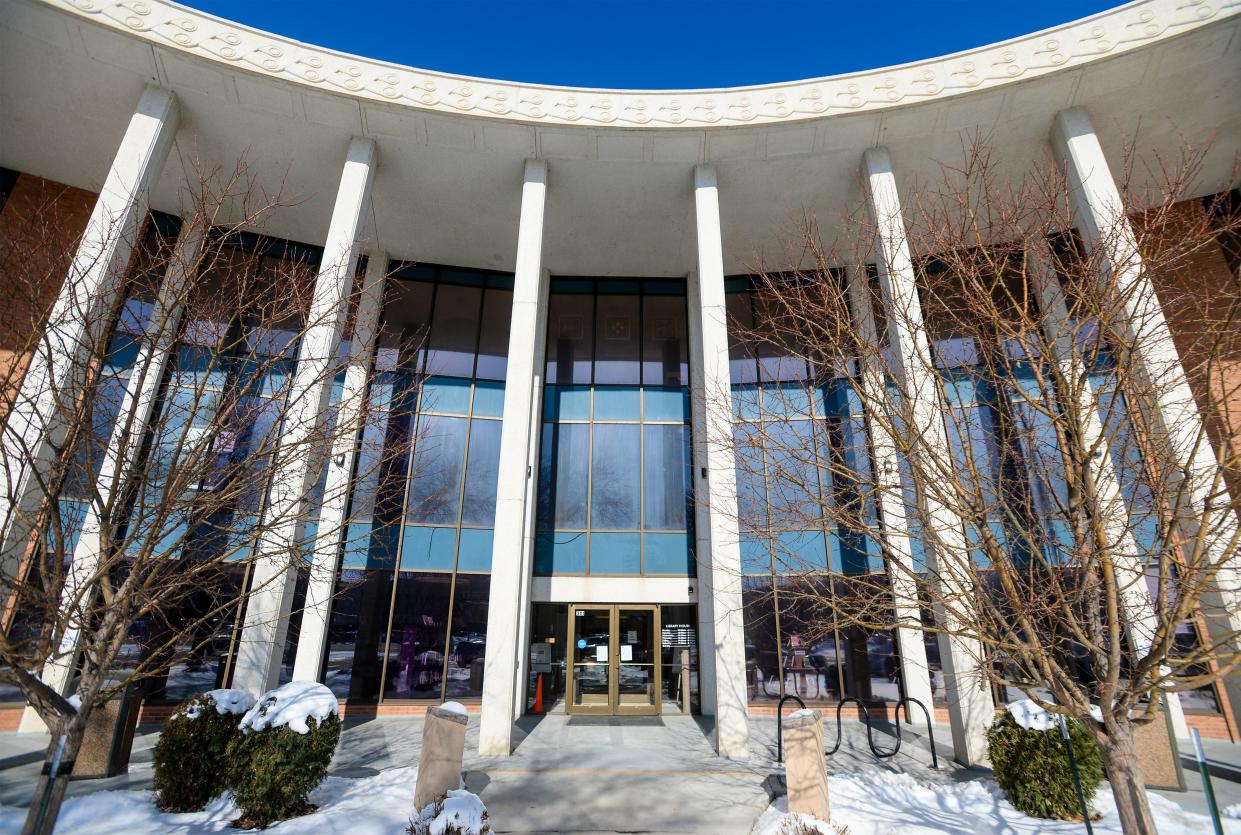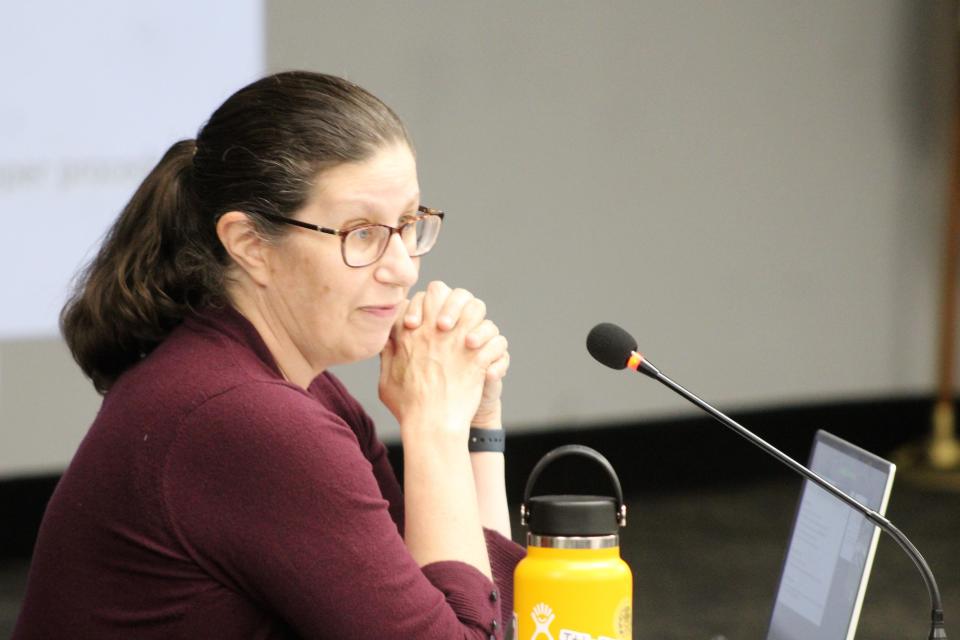Public safety needs, after levy failure, could mean cut to Great Falls library budget

At a work session of the Great Falls City Commission on Tuesday, Public Library Director Susie McIntyre presented an ambitious plan to expand library operations in the coming year.
However, success at the polls can bring its own challenges. The Great Falls Public Library’s expansion plans may have to be amended after it was revealed Tuesday afternoon that the city commission will consider reducing its funding for the library by more than $830,000 annually to bolster funding for the city’s fire, police, and municipal court departments.
That uncomfortable possibility is in response to the failure of the city’s Public Safety Levy on November 7. Had the levy passed it would have increased funding for Great Falls’ fire, police, and municipal court system by $12.35 million annually. However, Great Falls voters rejected the proposal by a nearly two to one margin. Now city officials are taking a hard look at every available resource to increase funding for public safety. That includes the possibility of diverting up to $833,000 in discretionary funds away from the library to be added to the budgets of the city’s public safety departments.
“They’re in triage mode right now,” commissioner Rick Tryon said of the city’s fire, police and municipal court departments. “The last update I got from our city attorney was that they’re looking about having to forget about prosecuting first-offense DUIs. They’re overworked, understaffed and they’re overwhelmed. The police and fire departments are also in a triage mode on the services they can and can’t provide. There are hard choices coming up. Really, really hard choices.”
“The voters were pretty clear that they’re taxed out,” he added. “We have to find a way to adequately fund our public safety which is the number one priority, always. I would think most people would acknowledge that the first responsibility of any government entity is public safety. We have to find ways with the resources that we already have available to a least make a dent in this deficit funding for our public safety.”
According to statistics provided by the library, if operational funding were to remain in place as it is structured today the Great Falls Public Library could anticipate funding from all sources to amount to nearly $3.12 million annually. Almost 92% of that would come from city property tax collections, but not all the city’s contributions to the library’s budget are equal.
As it is currently structured the city’s contribution to the library’s operating budget consists of three mill levies; a two-mill funding levy approved by voters decades ago, the 15-mill levy approved by voters last June, and a seven-mill levy that was never voted upon but was added as part of a management agreement negotiated and agreed upon by the library and the city commission in 1993. It is these final seven-mills, currently worth about $833,000 annually, which are at issue.
“The previous seven-mills funding was never voted upon by the voters,” Tryon said. “It’s a management agreement entered into 30 years ago between the City of Great Falls and the public library. That funding is taxpayer funding that belongs to the city. It does not belong to the library. It is the city’s funding that they can use as the City of Great Falls at our discretion - and right now – things change, priorities change. We actually need that money for public safety.”
According to City of Great Falls’ Finance Department, every mill of city property tax assessment is currently worth approximately $119,000. At the current tax rate package, the levy last June added $1.785 million to the library’s annual operating budget, minus a $350,000 supplementary appropriation from the city’s general fund that was discontinued after the levy passed. In total the city would have added a little more than $950,000 in funding to the library's operating budget. That may not happen.
If the seven-mills of funding from the 1993 agreement were to be rescinded, the library would still retain 17 mills of property tax funding plus county and state contributions. Its total annual operations budget including all revenue streams would hover somewhere around $2.28 million. That's significantly less than the $3.12 million the library had planned for in 2024, yet far more than the $1.48 million it would have had to work with had the June 6 library levy failed. If the city does decide to redirect the seven-mills that were approved 30 years ago it would cut the library’s additional funding nearly in half.
The conditions of the 1993 management agreement stipulate that both the city and the library can terminate the agreement at will but must provide a written notice of termination no later than April 1 of any given year, 90-days prior to when the management agreement automatically renews on July 1.
“Either party can give notice that they are no longer going participate in that agreement,” Tryon said. “The only thing at issue in that agreement is the seven mills. Those were not voted mills. Those were mills by agreement between the city and the library back in 1993, and it's automatically renewed every year. I plan to put that on the table, but of course it will be up to the full five-member commission to make a determination. The seven-mills would be the only thing that would be on the table here.”
At this date the library’s Board of Trustees have not met or had the opportunity to discuss the possibility that the 1993 management agreement could be discontinued. The next meeting of the library board will be on January 23. Library Director Susie McIntyre commented that the city’s financial support for the library is well established, and that clawing back more than $830,000 in financial support would run counter to a review that occurred less than a decade ago.
“This was an agreement that was made in 1993, but in 2016 the commission looked at this agreement and updated the ordinances and explicitly said that any and all contracts between the City and the Board in effect of the date of adoption shall remain in full force and effect,” McIntyre said. “It’s not like it hasn’t been reviewed and looked at. In 2016-2017 there was a full review of it, and it was approved.”

In the wake of last June’s passage of the library levy, which will add roughly $1.435 million to the Great Falls Public Library’s annual operating budget, the library had planned to hire seven new full-time staff and nine part-time staff. Those hirings would allow the library to remain open seven days a week, and would provide funding to expand early literacy and afterschool programs for children, extend programing for people who are disabled and/or homebound, run the bookmobile six days a week instead of just three, offer computer technology classes and support for job seekers, and broaden programming for adults and families with events like Shakespeare in the Park, author talks, and book clubs.
“The library has been providing service to the citizens of Great Falls for over 100 years,” McIntyre added. “We take our role in ensuring that people have access to the information and resources they need to be successful very seriously. The board has not had a chance to review the numbers or to start thinking about a budget for this year. I do not think it is a choice between public safety and the library. We believe that the library is an essential piece in having a safe and successful community. Exactly how all those funds get worked out is going to be a conversation that’s going to have to be done in good faith between the library board and the city commission. I’m not going to choose an ‘either/or’ option. This is a ‘both/and’ conversation. Our community deserves both an excellent library and to be safe.”
The Great Falls Public Library is not the only city department that should to be looking over its shoulder at public funding. Tryon said that general fund appropriations to all departments will be examined during this year’s budgeting process.
“Most of the departments outside of fire, police, courts, and administrative fund themselves through fees for services like garbage collection, water and sewer,” Tryon explained. “Some of these departments like Parks and Recreation have to be subsidized through the general fund, but that’s not what you want. You don’t want the general funds subsidizing the departments that are supposed to be funded through their own revenue streams. I would imagine that this year because of the rising cost of everything and the almost crisis our public safety posture is in at this point that we’ll be looking at all of them.”
Tryon said he hopes that the seven mills in library funding, the $350,000 in general fund subsidies which have now been discontinued, and roughly $240,000 in marijuana tax income the city expects to realize will all be folded back into the general fund to offer at least an additional $1.42 million in additional funding for public safety.
“It doesn’t come close to what we really need, but it’s a starting point,” Tryon said. “It’s not going to be enough at this point, but at least it can be a step in the right direction and then we can go from there.”
Asked if diverting $830,000 in funding away from the library after voters had approved a 15-mill levy to expand library services runs counter to the will of the voters, Tryon responded that it’s simply a matter of prioritizing the fundamental services the city provides to its citizens.
“My answer to that is this – so then we leave our police unfunded?" he said. "We leave our fire department unfunded? We leave our courts unfunded; and we leave public safety unfunded because the library needs to expand? That doesn’t seem to be a very logical or practical or common-sense approach to me.”
Tryon added that the hopes and expectations for continued growth and prosperity in Great Falls hinge in no small part upon how the city funds its public safety infrastructure.
“Everybody wants the big company to come to Great Falls and relocate and have all of these wonderful jobs here and all these wonderful restaurants,” Tryon said. “None of that is going to happen if we don’t have public safety and public infrastructure that is adequate to meet the needs of our businesses and our people.”
“If it is the will of the commission as a whole to renegotiate the agreement, I have every expectation that we will all be servants of the community and try to do what’s best,” McIntyre countered. “The community did vote on June 6 and agreed that the library should be better supported. This is the very start of what will be an ongoing conversation.”
This article originally appeared on Great Falls Tribune: Library funding cut on the table according to Great Falls commissioner

